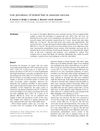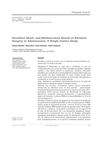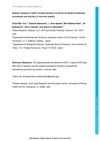 4 citations,
March 2023 in “Current Oncology”
4 citations,
March 2023 in “Current Oncology” Scalp cooling is the only FDA-approved method to prevent hair loss from chemotherapy, but other treatments like minoxidil and PRP are being tested.

Plant-based compounds can improve wound dressings and skin medication delivery.
 11 citations,
December 2022 in “Arterial Hypertension”
11 citations,
December 2022 in “Arterial Hypertension” New guidelines stress early diagnosis and lifestyle changes to manage metabolic syndrome and prevent complications.
 3 citations,
January 2015 in “Evidence-based Complementary and Alternative Medicine”
3 citations,
January 2015 in “Evidence-based Complementary and Alternative Medicine” Pumpkin seed oil may help hair growth, but more research needed on frontal hair loss and long-term effects.
1 citations,
April 2022 in “Acta histochemica” Pumpkin seed oil promotes hair growth and improves hair texture without harmful effects.
 1 citations,
July 2012 in “EFSA Journal”
1 citations,
July 2012 in “EFSA Journal” The combination of certain vitamins and pumpkin seed oil has not been proven to maintain normal hair.
 September 2024 in “Journal of the American Academy of Dermatology”
September 2024 in “Journal of the American Academy of Dermatology” The supplements improved hair density and reduced hair loss.
 November 2014 in “Hair transplant forum international”
November 2014 in “Hair transplant forum international” Pumpkin seed oil may help with hair loss.
September 2022 in “International Journal of Science and Research (IJSR)”  11 citations,
November 2022 in “JAMA dermatology”
11 citations,
November 2022 in “JAMA dermatology” Some nutritional supplements may help treat hair loss with generally mild side effects.
 3 citations,
February 2024 in “International Journal of Pharmaceutical Sciences Review and Research”
3 citations,
February 2024 in “International Journal of Pharmaceutical Sciences Review and Research” Herbal hair oil with natural ingredients promotes healthy hair and addresses common hair issues.
 January 2024 in “Brazilian Journal of Hair Health”
January 2024 in “Brazilian Journal of Hair Health” Some plant-based products might treat hair loss with fewer side effects than current medications.
April 2023 in “International Journal of Dermatology” More research is needed to confirm if popular hair oils effectively treat hair loss.
 16 citations,
June 2005 in “Clinical and Experimental Dermatology”
16 citations,
June 2005 in “Clinical and Experimental Dermatology” Twisted hair is rare in severe anorexia nervosa, found in only 2 out of 30 patients.
 130 citations,
January 2005 in “American Journal of Clinical Dermatology”
130 citations,
January 2005 in “American Journal of Clinical Dermatology” Eating disorders like anorexia and bulimia cause skin problems, and dermatologists can help detect these disorders early for better treatment outcomes.
 53 citations,
January 2017 in “BioMed research international”
53 citations,
January 2017 in “BioMed research international” Genetically modified plants could be an important source of omega-3 fats to meet global needs.
 14 citations,
December 2011 in “Archives of Dermatological Research”
14 citations,
December 2011 in “Archives of Dermatological Research” Phyto-vesicles of β-sitosterol may effectively treat hair loss.
 8 citations,
January 2019 in “Chirurgia”
8 citations,
January 2019 in “Chirurgia” Bariatric surgery is safe and effective for treating adolescent obesity.
 3 citations,
November 2020 in “Curēus”
3 citations,
November 2020 in “Curēus” A child's hair loss from alopecia areata was fully reversed in five months using diet and supplements.
 2 citations,
July 2019 in “Journal of psychology & clinical psychiatry”
2 citations,
July 2019 in “Journal of psychology & clinical psychiatry” Zinc helps reduce the severity of depression.
 2 citations,
December 1983 in “Outlook on Agriculture”
2 citations,
December 1983 in “Outlook on Agriculture” Plant hormones have potential in agriculture to increase food production but require more research for effective use.
 June 2015 in “Journal of the turkish academy of dermatology”
June 2015 in “Journal of the turkish academy of dermatology” Eating the right foods is important for skin health and can help treat some skin conditions.
 May 2024 in “Journal of cosmetic dermatology”
May 2024 in “Journal of cosmetic dermatology” A shampoo with caffeine and adenosine may help prevent hair loss and thicken hair.
4 citations,
December 2020 in “Current sports medicine reports” Athletes usually get enough vitamins and minerals from a healthy diet, and supplements are only needed for those with actual deficiencies.
3 citations,
December 2021 in “Acta dermato-venereologica” People with androgenetic alopecia have a higher risk of metabolic syndrome.
 1 citations,
July 2024 in “Skin Research and Technology”
1 citations,
July 2024 in “Skin Research and Technology” High-frequency ultrasound can effectively visualize and assess hair loss.
 1 citations,
September 2021 in “Skin appendage disorders”
1 citations,
September 2021 in “Skin appendage disorders” Botulinum toxin injections can help treat common hair loss in men, but more research is needed to confirm this and understand how it works.
 August 2024 in “Skin Research and Technology”
August 2024 in “Skin Research and Technology” Omega-6 and LDL cholesterol increase the risk of hair loss.
 February 2024 in “Biomedicines”
February 2024 in “Biomedicines” Hormones like androgens, estrogen, thyroid hormones, and stress hormones can contribute to hair loss, and treatments target these hormonal imbalances.
 11 citations,
June 2017 in “Journal of cell science”
11 citations,
June 2017 in “Journal of cell science” AGD1's PH domain is essential for its role in root hair growth and polarity.
























